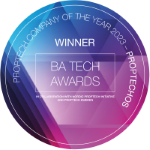- Introduction [00:00:00]
- The Importance of Standards [00:02:00]
- AI Agents in Building Automation [00:05:00]
- The Role of Knowledge Management [00:08:00]
- Decentralization vs. Centralization in Building Systems [00:11:00]
- Governance and Cybersecurity [00:14:00]
- Future AI Standards [00:16:00]
- Vision for Autonomous Buildings [00:20:00]
- Conclusion [00:24:00]
Summary
Introduction [00:00:00]
Erik: Welcome to ProptechOS Best of Breeds podcast. Today I have with me Rikard Strid, the CEO of KTC, a BAS, and PLC company.
Rikard: Thank you. I'm very happy to be here.
Erik: Nice to meet in person after many online meetings during the pandemic.
Erik: You’ve basically been working in KTC since childhood.
Rikard: My dad founded KTC 45 years ago. I grew up in this industry, but I also worked in Smart Home and IoT for 15 years before returning to KTC.
Erik: You’ve contributed significantly to IoT standardization in organizations like IEEE, ISO, and SIS.
Rikard: Yes, we’re focused on building automation and helping buildings become autonomous.
The Importance of Standards [00:02:00]
Erik: Why are standards still important when we have AI?
Rikard: Standards are essential for interoperability. Just like TCP/IP for the internet or 50 Hz for the power grid, standards help systems work together.
Erik: AI can’t replace standards; we still need structure for efficient integration.
Rikard: Exactly. Standards are about creating scalable, interoperable systems.
AI Agents in Building Automation [00:05:00]
Erik: How do AI agents differ from traditional BAS systems?
Rikard: AI agents are like new colleagues with advanced toolsets, enabling improved control and decision-making. They can analyze historical data, predict future scenarios, and communicate through human interfaces.
Erik: So, AI agents enhance optimization and fault detection by integrating learning from data.
Rikard: Precisely, they work alongside human processes, offering insights and suggesting improvements.
The Role of Knowledge Management [00:08:00]
Erik: How do we store and use knowledge efficiently?
Rikard: Instead of just storing time-series data, we need to build knowledge graphs. This way, AI agents can access structured knowledge to make better decisions.
Erik: That’s the key to scaling AI applications from pilots to real-world deployment.
Rikard: Yes, combining data storage and knowledge management is crucial.
Decentralization vs. Centralization in Building Systems [00:11:00]
Erik: Should AI systems be centralized or decentralized?
Rikard: We favor hybrid systems – local edge computing combined with cloud resources. This approach balances real-time processing with long-term analysis.
Erik: Hybrid systems ensure continuity, even during network failures.
Rikard: Exactly, and they offer flexibility for building owners who may or may not want centralized intelligence.
Governance and Cybersecurity [00:14:00]
Erik: What about security concerns in autonomous systems?
Rikard: Security breaches in building automation are a risk. Integrating cybersecurity from the ground up is essential to prevent system manipulation.
Erik: It's crucial to address these vulnerabilities early on.
Rikard: Definitely, and we also need protocols like MCP and A2A to standardize AI communication.
Future AI Standards [00:16:00]
Erik: What standards are emerging for AI integration?
Rikard: MCP (Model Context Protocol) and A2A (Agent to Agent) are gaining traction. Major companies like OpenAI and Google support them, enabling seamless communication between AI agents and data sources.
Erik: MCP is already becoming a standard, which simplifies integration.
Rikard: Yes, it’s crucial for the fast adoption of AI-driven building systems.
Vision for Autonomous Buildings [00:20:00]
Erik: What does the future hold for building automation?
Rikard: The focus will be on transforming analog knowledge into digital formats, creating collective brains through knowledge graphs. Autonomous systems will handle maintenance, optimization, and transactions.
Erik: So, it’s about making buildings self-governing and adaptive.
Rikard: Absolutely, and we need tools to digitize and maintain this knowledge over time.
Conclusion [00:24:00]
Erik: How do we prepare for the future of AI in building management?
Rikard: Embrace standards, digitize knowledge, and make AI part of the team. It’s also crucial to experiment with AI tools like ChatGPT to stay ahead.
Erik: Agreed. We need to balance innovation with practical implementation.
Rikard: That’s the way forward. Thanks for having me!
Erik: Thank you, Rikard. And thanks to everyone for listening to the ProptechOS Best of Breeds podcast.
